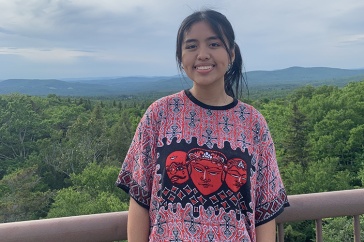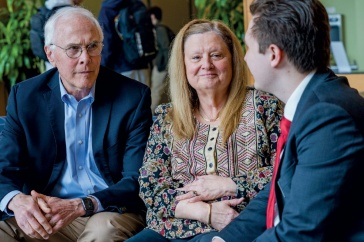
?
There is some good news from Liberia about Ebola: Some people are getting better. That's the message that Brig. Gen. Peter Corey, UNH class of 1983, wants to make sure people back home are getting.
"There are people being healed and being able to go back to their families. It's perhaps equally exciting but less dramatic [than the bad news]: folks do get cured and get to return home," Corey says during a phone call from Monrovia, where he has been leading U.S. Army troops helping in the effort to stop the spread of the deadly disease.
Since arriving just more than a month ago, Corey and his team have erected a 25-bed hospital to treat healthcare workers who become infected, built two mobile medical labs for diagnostics, speeding up diagnoses for patients who may have the disease and setting up Ebola treatment units (ETUs) for the doctors fighting the Ebola outbreak.
"These units isolate a patient from the general population so that they can receive treatment. They help stop the spread of the disease, ensure the patient gets proper care and increase his or her chance for survival," says Corey, whose unit will build 10 of the 30 medical units being built across the country.
Already, the labs are making a difference: More than 1,500 samples from patients have been tested thanks to the new facilities, according to the U.S. Department of Defense.
The advance team also has built out a sustainment base for future personnel who will arrive there as part of Operation United Assistance, the U.S. Department of Defense's mobilized effort to fight the Ebola outbreak.
The days, in other words, are long ones, and the work is not easy, especially considering the lack of infrastructure throughout Liberia, where Corey was stationed in 2006-2007 as part of a UN peacekeeping mission.
Since emerging from civil war in 2003, says Corey, Liberia has struggled to rebuild government institutions and services that Americans might take for granted.
"There is no power grid, no reliable water, no sewage treatment system. What little infrastructure there is, you might see in the capital city, but it's really nonexistent beyond that. There are very few paved roads, and those that are paved are in a state of disrepair. The health system is fragile, the security system is fragile," he says. "Unfortunately the progress that has been made since 2003 is taking a heavy hit from the outbreak of this disease."
This type of work — domestic support operations and response to natural and manmade disasters — is all part of the job for the N.H. Army National Guardsman who is the deputy commanding general for U.S. Army Africa and also serves as director of N.H. National Guard's Joint Staff.
The people of Liberia are friendly to Americans but frightened, and rightfully so, says Corey. The outbreak is the worst since Ebola first was reported in Zaire in 1976. The current outbreak has killed nearly 5,000 people, mainly in the countries with widespread transmission: Liberia, Guinea and Sierra Leone.
"There is a sense of desperation ... I hear it as I talk to many of the Liberians," he says. Still, he notes that the dramatics of the day-to-day life in Liberia and other hot zones may be overplayed in the American media. "You don't see bodies lying in the street, or dazed people wandering aimlessly, but they know it's certainly very serious. Whole families have been wiped out, some villages have lost sizable percentages of their population."
In the streets of Monrovia, what you will see are posters and signs warning about Ebola, and telling people where to get treatment. Most buildings have a bucket of chlorinated water at the entrance to rinse your hands, and a tray of the same to wash your feet. Guards will take your temperature before you are allowed to enter a public building— Corey and his group have their temperature taken twice a day.
Being on the frontlines against a deadly disease was certainly something his wife Margaret (Machell) Corey ’83 and three children — Kerstin ’11, Dana ’13 and Joseph ’14 — were concerned about.
"There initially was a lot of nervousness; two of our kids were pretty emotional about it. But we talked about it. I've deployed to many places in the world that are dangerous for various reasons, and every time I've come back," Corey says. "They appreciate what I do, and they are all very supportive."
With the U.S. military response acting as a support to lead response agencies like USAID, the CDC and the Liberian Ministry of Health, Corey admits it's hard to know how long the outbreak will continue.
"'The enemy gets a vote' we like to say, and the enemy in this situation is Ebola. Do we know if there will be a definite end to this? No. Only Ebola will decide that, I guess."
Vicki (Wahl) Jensen: From Durham to Homeland Defense
Vicki Jensen '97 '00G has to remind her family all the time: she is not a medical doctor.
But you can't blame them if they consider her a bit of a disease expert. She might not be able to tell you why your back aches or how to get over the flu quicker, but she is studying some of the world's deadliest diseases in a government anti-bioterrorism lab in Washington, D.C.
Jensen is senior principal investigator of virology at the National Biodefense Analysis and Countermeasures Center and the deputy director of its national Biological Threat Characterization Center. She has worked extensively in Biosafety Level 4 labs, studying live strains of diseases like the Ebola, Marburg, Lass and Nipah viruses, with a focus on the pathogenesis of emerging infectious diseases.?And she's certainly an expert on Ebola — the deadly virus getting so much press these days was the focus of her doctoral research at the University of Manitoba.
"Ebola is so different because the virus only has seven genes in its entire genome, but it is able to wreak such havoc on its host ...I found that fascinating," she said. By comparison, smallpox has hundreds of genes. "Ebola is really a lot of bang for its genomic buck."
When she entered UNH, the Connecticut native already thought she might be interested in studying microbiology. In Richard Blakemore's class, she read The Hot Zone? by Richard Preston, "and it really kind of hooked me" says Jensen.
She thrived in Aaron Margolin's virology courses through UNH's College of Life Sciences and Agriculture, and she considers emeritus professor of microbiology Frank Rodgers her most influential mentor.
"Frank absolutely shaped what I'm doing now," Jensen says of her work on the National Interagency Biodefense Campus at Fort Detrick, Md.
That work focuses on knowledge gaps, explains Jensen. As part of the Department of Homeland Defense, Jensen and other scientists are looking at questions like what if a terrorist group tried to use diseases like the Ebola virus as a weapon. They study the factors that would have to happen for that to be a reality — and what would the risks be: How many people could be affected, and would there be medical countermeasures??
She was recruited to her current position a little over a year ago from a position at the National Institute of Health.
Once she learned more about what the job would be, Jensen says, "I thought, 'This is something extremely relevant.' I realized the impact it could have."
Of this most recent Ebola outbreak in West Africa, Jensen notes that it's different than past outbreaks in that it's been more deadly — as of Nov. 5, 4,818 people have died from the disease — and that it's an urban outbreak.
"In the past, Ebola would just burn out since the virus replicates fast and the disease course is quick. ... Now that it's impacting an urban area without resources, it's become very challenging."
As someone whose daily work life centers on infectious diseases, Jensen has a mixed reaction to the news coverage of Ebola in America. She believes it's a very real crisis in Africa, but that it didn't get the attention it needed in the beginning — perhaps why it grew so fast there.
"What I don't like seeing, personally, is the reaction of mandatory quarantine for 21 days. You're going to have a harder time recruiting people to go over there if that becomes the practice," she says.
She reminds us that while there are still a lot of questions about Ebola and its pathogens, the advice coming out of the CDC right now is accurate.
"We have to understand this is the first time we've seen this coming on our doorsteps; there's going to be ... a little bit of a learning curve in terms of the data. There's a lot we don't know about Ebola, but you could look at the common cold and say there's still a lot we don't know," she says.
Jensen, who's married to fellow UNHer James Jensen '00 and mom to a 7-year-old and 5-year-old, won't call herself an expert, but she has been recognized for her work outside of the high-level scientific circles in which she works. She was featured last year in a National Geographic article on risk takers (calling them the modern day explorers of their generation). It was a thrill, but also a bit embarrassing, she admits.
"My colleagues got to tease me a lot about it, and my parents got a kick out of it," Jensen laughs. "I didn't realize my mother actually photocopied the article and sent it out with her Christmas cards to friends and family."
— College of Life Sciences and Agriculture staff writer Victoria Courtland contributed to this article.
Want To Know More?
To learn the latest about Ebola, including the history of this and other outbreaks, visit the Centers for Disease Control and Prevention's Ebola homepage.
In 188体育app_188体育在线-平台官网's Nov. 13 Edition
Read about how UNH nursing students are learning about the Ebola virus.?
Related:
Journey to the Hot Zone




















































